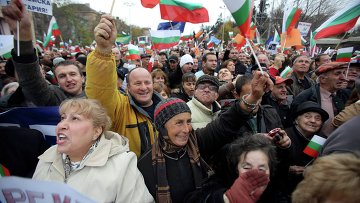
Max Rivlin-Nadler
Max Rivlin-Nadler is a founding editor of Full Stop Magazine and has written for the New York Times, The Nation, and Gawker.
December in Kiev has been explosive, as Ukrainians took to the street to demand their president make an agreement with the European Union. They hoped that the agreement would put some distance between Ukraine and Russia, and give their country a better shot at economic prosperity. But prosperity does not always accompany European Union integration. For a cautionary tale, Ukraine has to look no further than its southern neighbor, Bulgaria. Since joining the European Union in 2007, Bulgaria has been plagued by the same corruption, political turbulence, and stalled economy that Ukrainians are hoping to escape.
At the University of Sofia in Bulgaria, where a wave of student protests confronted the parliament last month, students hung a banner declaring what, in their opinion, were the three most important years in modern Bulgarian history: 1968, 2007, and 2013. These are the years, respectively, of student protests against Soviet rule across Eastern Europe, Bulgaria’s joining the E.U., and when students hope Bulgaria finally rids itself of the corruption that has left it the E.U.’s poorest member.
"There are no jobs for young people here,” Lyubomira Kostova, a 23-year-old student, told me as we walked toward the parliament building in November, where this past summer protestors forced the resignation of the previous government. Demonstrations resumed in the fall, this time against the new ruling socialist party, after a series of policies and appointments signaling that the ruling elite the country’s national resources. "No matter who is in charge, they work for the same people—the rich,” Kostova added .
It wasn’t supposed to be this way. Back in 2007, when Bulgaria joined the European Union, politicians and citizens viewed it as the end of a long march to modernity. "This is a day of historical justice, because Bulgarians have always been Europeans in spirit and identity," the Bulgarian president told a crowd gathered on the day of their E.U. ascension. In Ukraine, the sentiment today is similar: "Europe was the way out of the mess we're in, the way out of the corruption that has overwhelmed our country," Andrey Dobrolet, a Ukrainian lawyer, .
But Bulgaria is still home to rampant corruption, the same sort that has landed Ukraine so deeply in debt. It is stillrun by a group of oligarchs whose power dates back to the Soviet Union. A few powerful corporations own the media, which has silenced most critical reporting, while more than 20 percent of the population lives below the poverty line.
"It’s not the system that’s broken, it’s the corruption that breaks it,” Bulgarian law student Jordan Tsalov told me, sporting a black-eye police had given him a previous night, during protests against the parliament. "The system is good, we just need people with ethics.”
European Union membership also allows easy migration between member nations, which has led to a steady flow of young people out of Bulgaria. Many take low-paying service jobs in other countries. College-educated Bulgarians flee for advanced sectors in countries like Germany and Sweden. The European Union’s own economic outlook for Bulgaria has been dismal, with out-migration playing a role in declining tax revenues. The stagnant economy has also allowed extremist political parties to return to the political scene, riding a wave of discrimination against Bulgarians of Turkish descent and Syrian refugees.
As Bulgaria demonstrates, agreements with the European Union don’t always work in your favor. While Western Europe continues a slow recovery from the fiscal crisis, Eastern Europe is again plunging into poverty, caught between a German-dominated European Union and Russia. While looking for a way out of their own debt, the "in-between” countries are being forced to choose sides, neither of which offer a fair deal that will help the prospects of the average Eastern European.



_jpg/250px-ElbeDay1945_(NARA_ww2-121).jpg)





